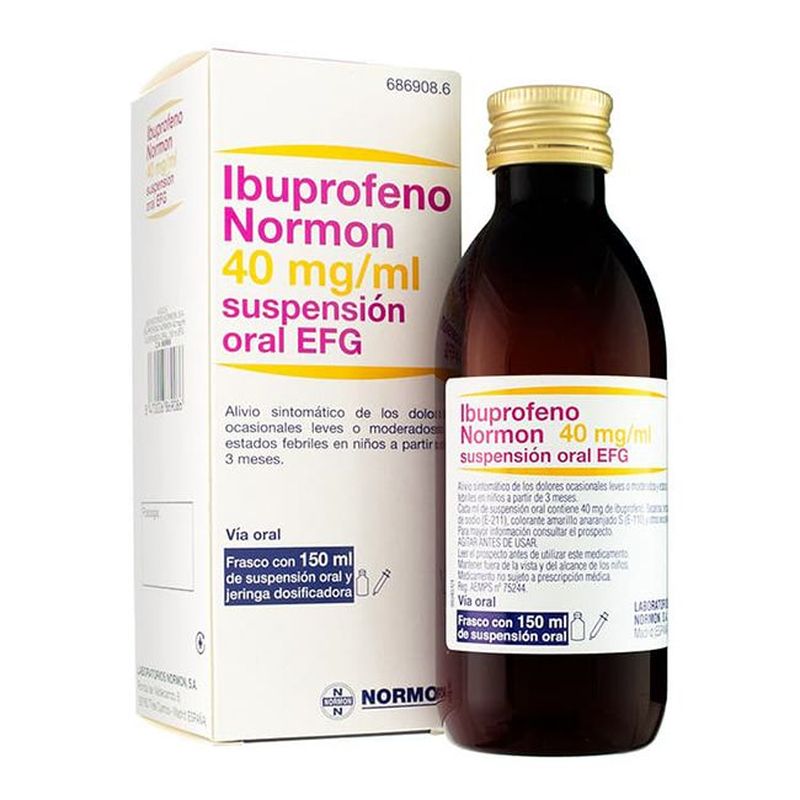Normon Ibuprofen is indicated for the symptomatic relief of occasional mild to moderate pain and fever.
1 bottle 150 ml

This medicine is indicated for the symptomatic relief of occasional mild to moderate pain and fever.
This medicine is for use in infants over 3 months and children up to 12 years of age.
For occasional use only and for limited periods. The lowest effective dose should be used for the shortest time necessary to relieve symptoms. If you have an infection, consult a doctor without delay if symptoms (such as fever and pain) persist or worsen.
Ibuprofen Normon is a suspension for oral administration. It can be taken straight or diluted in water.
Ibuprofen acid is a racemic compound, of which the S(+)-enantiomer possesses almost all the pharmacological activity. In vivo, almost 70% of the R(-)-enantiomer of acid ibuprofen is converted to the pharmacologically active S(+)-enantiomer.
Linear pharmacokinetics in the 200-800 mg dosage range.
Administration of the medicinal product is dependent on the onset of pain or fever. As soon as these disappear, the medication should be discontinued.
The recommended dose of ibuprofen depends on the age and weight of the child. As a general rule, for children from 3 months to 12 years of age, the recommended daily dose is 40 to 30 mg per kg body weight, depending on the intensity of the symptoms, divided into three doses. The use of this medicine in children under 2 years of age should always be prescribed by a doctor.
| Approximate age | Body weight | Recommended dosage per single dose (x3) | Maximum daily dose (in 24 hours) |
|---|---|---|---|
| 3 to 6 months | 5 kg | 1.8 to 2.4 mL | 7.2 mL (144 mg) |
| 6 kg | 2 to 3 mL | 9 mL (180 mg) | |
| 7 kg | 2.4 to 3.4 mL | 10.2 mL (204 mg) | |
| 6 to 12 months | 8 kg | 2.8 to 4 mL | 12 mL (240 mg) |
| 9 kg | 3 to 4.4 mL | 13.2 mL (264 mg) | |
| 12 to 24 months | 10 kg | 3.4 to 5 mL | 15 mL (300 mg) |
| 12 kg | 4 to 6 mL | 18 mL (360 mg) | |
| 2 to 3 years | 14 kg | 4.8 to 7 mL | 21 mL (420 mg) |
| 4 to 5 years | 16 kg | 5.4 to 8 mL | 24 mL (480 mg) |
| 18 kg | 6 to 9 mL | 27 mL (540 mg) | |
| 6 to 9 years | 20 kg | 6.8 to 10 mL | 30 mL (600 mg) |
| 22 kg | 7.4 to 11 mL | 33 mL (660 mg) | |
| 24 kg | 8 to 12 mL | 36 mL (720 mg) | |
| 26 kg | 8.8 to 13 mL | 39 mL (780 mg) | |
| 10 to 12 years | 28 kg | 9.4 to 14 mL | 42 mL (840 mg) |
| 30 kg | 10 to 15 mL | 45 mL (900 mg) | |
| 32 - 36 kg | 10.8-12 to 16-18 mL | 48-54 mL (960-1080 mg) | |
| 36 - 40 kg | 12-13.4 to 18-20 mL | 54-60 mL (1080-1200 mg) |
The suspension can also be dosed in a four-daily dosing schedule. In this case, the maximum daily doses should not be exceeded within 24 hours. The dose to be administered at each intake, every 6 hours, will be recalculated/reduced proportionally.
If you are allergic (hypersensitive) to ibuprofen or any of the other ingredients of this medicine, including non-steroidal anti-inflammatory drugs (NSAIDs) or aspirin. Allergic reactions may include itchy rash, swelling of the face, lips or tongue, runny nose, difficulty breathing or asthma.
You should not use this medicine if you have severe liver or kidneydisease, have had a stomach or duodenal ulcer or bleeding, vomit blood, have black stools or bloody diarrhea, have bleeding or blood clotting disorders, or are taking anticoagulants. It is also contraindicated in cases of severe dehydration, severe heart failure or during the third trimester of pregnancy.
Serious skin reactions such as exfoliative dermatitis, erythema multiforme, Stevens-Johnson syndrome, toxic epidermal necrolysis, and others have been reported. Discontinue treatment and seek medical attention immediately if you notice any of these symptoms.
Tell your doctor if you have oedema (fluid retention), have or have ever had a heart disorder or high blood pressure, have asthma, or are being treated for liver or kidney problems, or if you have a history of gastric ulcer.
Tell your doctor if you are taking other medicines, including over-the-counter medicines, herbal supplements and vitamins. Ibuprofen may interact with medicines such as blood thinners, antihypertensives and other anti-inflammatory drugs. Make sure your doctor knows about all the medicines you are taking.
The use of ibuprofen during pregnancy is contraindicated during the third trimester. During the first and second trimesters, it should only be used if the potential benefit to the mother justifies the potential risk to the foetus. For breast-feeding, ibuprofen is excreted in breast milk in very low amounts, so it may be used with caution under medical supervision.
Keep this medicine in the original pack at a temperature not exceeding 25°C. Keep the bottle tightly closed and out of the reach of children. Do not use the medicine after the expiry date stated on the pack.
For any further questions on the use of this medicine, please contact your doctor or pharmacist. This information is general information and is not a substitute for personal medical advice.
